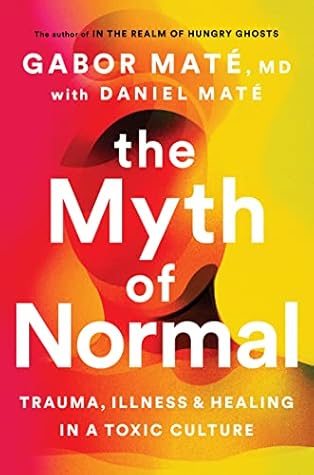More on this book
Community
Kindle Notes & Highlights
by
Gabor Maté
Read between
July 28 - August 15, 2025
All in all, the system works with cyclic elegance: a culture founded on mistaken beliefs regarding who and what we are creates conditions that frustrate our basic needs, breeding a populace in pain, disconnected from self, others, and meaning. A select few—especially those with the sorts of early coping mechanisms that prime them to deny reality, block out empathy, fear vulnerability, mute their own sense of right and wrong, and abjure looking at themselves too closely—will be elevated to power. There they govern over a majority who so crave comfort and stability, who are so ground down by
...more
if cure is the banishment of life-impairing symptoms or conditions, healing is the process of reuniting ourselves with the inner qualities that still live within us as inherent possibilities, as I believe they always do, and that make life worth living.
If the heart is our best compass on the healing path, the mind—conscious and unconscious—is the territory to be navigated. Healing brings the two into alignment and cooperation,
We can do nothing about the world that created our mind, that may have instilled in us limiting, harmful, untrue beliefs about ourselves and others. However—and here’s the good news I alluded to—we can learn to be responsible for the mind with which we create our world moving forward.
There is no freedom in having to be “good” or the most talented or accomplished, or in the need to please or entertain or be “interesting.”
The willingness to seek the why before leaping to the how is the compassion of curiosity and understanding in action.
It is the movement toward experiencing oneself as a vital whole, whatever may be happening corporeally. Healing is not an endpoint: it is as much a process as disease is.
it’s possible to gain the capacity to accept life as it actually is, the authenticity to search for our own truth in all situations, and the agency to choose our response to whatever occurs.
b. The personality is an adaptation. What we call the personality is often a jumble of genuine traits and conditioned coping styles, including some that do not reflect our true self at all but rather the loss of it.
The disconnect from self is endemic in our materialist culture, encouraged and then exploited in many spheres, from economic to cultural and political.
Everything within us, no matter how distressing, exists for a purpose; there is nothing that shouldn’t be there, troublesome and even debilitating though it may be. The question thus shifts from “How do I get rid of this?” to “What is this for? Why is this here?” In other words, we endeavor first to get to know these irksome aspects of ourselves and then, as best we can, to turn them from foes to friends.
When a young person’s universe is in turmoil—when things fall apart and the center cannot hold, to channel Yeats[*]—there are two working theories the child could adopt. One is that her little world is terribly awry and misshapen, her parents incapable or unwilling to love and care. In other words, she is unsafe. The other, which wins out virtually every time, is that she—the child—is flawed.
Under the influence of the acrid brew, these chants can take on synesthetic qualities: some people see images, while others experience the syllables as body sensations or travel in their minds to long-buried memories. A few are like me, and experience the disconcerting absence of these things.
“we need to celebrate and support people who are ill because they’re the canaries in the mine. They’re the ones who are showing us that our society is out of balance, and we need to thank them for taking that on and doing it for the rest of us. All of us need to participate in their healing, because if not for them, where would we be? We’re all responsible for whatever ails them.
a world that isolates even as it discourages healthy solitude.
This culture is a master at forgetting its past and obscuring the sordid aspects of its present.
we can revisit our list of the four A’s I laid out in chapter 26 that promote healing—authenticity, agency, anger, and acceptance—and add two more that are required for the pursuit of broad transformational change: activism and advocacy. The last two are socially meaningful ways of synthesizing the previous four, with some added ingredients—solidarity, collective thinking, and connection—to help counter capitalism’s atomizing effects.
the antidote to the hypnotizing influence of normality is authenticity:


